Oops! 7 Allies Biden Needlessly Angered in 2021
Upon assuming the presidency, Joe Biden promised the world, “America is back,” building on his campaign claims that President Donald Trump had severely damaged relations with the country’s allies.
It took very little time for Biden to turn that promise into a punchline, enacting bizarre unilateral policies that prompted distancing, confusion, and more than one passionate rant against his administration from heads of state of countries that traditionally have had no issue with Washington. On nearly every continent, Biden found a way this year to outrage allied leaders with policies that did little to benefit the United States.
Below, just seven of the allies around the world who trust America a little bit less thanks to Biden.
Diplomacy is back. pic.twitter.com/27D316PAqB
— President Biden (@POTUS) June 11, 2021
France
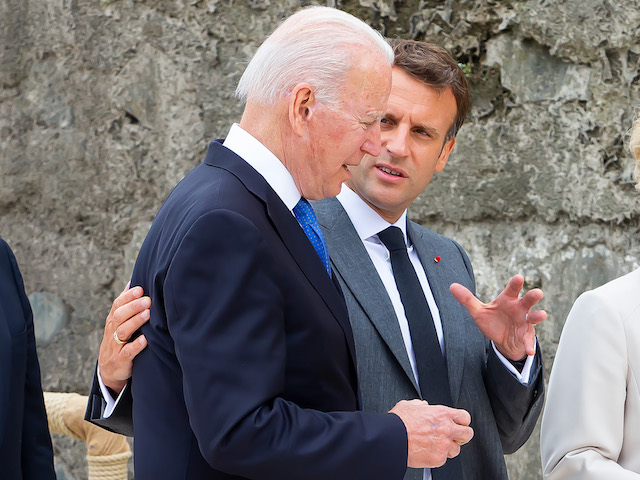
Joe Biden, president of the U.S., walks with Emmanuel Macron, president of France. Political leaders meeting at the G7 leaders’ “family photo” in Carbis Bay, Cornwall. (Jonny Weeks for The Guardian / NMA pool via AP)
The government of France – whose happiness at any given time with the White House has long been used as a barometer of good foreign policy due to archaic Revolutionary War sentiment – erupted in seething rage in September after the government of Australia canceled a contract from 2016 in which it promised to purchase 12 non-nuclear submarines from the French government. Canberra instead cut a deal with the Biden administration to buy the same technology, but both sides kept France in the dark and French officials only learned of the matter from news reports. Politicians from neither country bothered to tell France that Australia was walking out of its deal.
France withdrew its ambassador to Washington in response. French Foreign Minister Jean-Yves Le Drian was so angry with the move that he compared Biden to Trump, describing the submarine deal between Washington and Canberra as “brutal, unilateral, and unpredictable.”
“I was under the impression that France had been informed long before … honest to God I did not know you had not been,” a confused Biden told French President Emmanuel Macron during an in-person meeting in October.
“I think what happened was to use an English phrase, what we did was clumsy, not done with a lot of grace,” Biden said. “I was under the impression that certain things had happened that hadn’t happened.”
By December, Biden appeared to forget the incident, claiming, “Unlike Trump, I don’t shock our allies.”
Canada
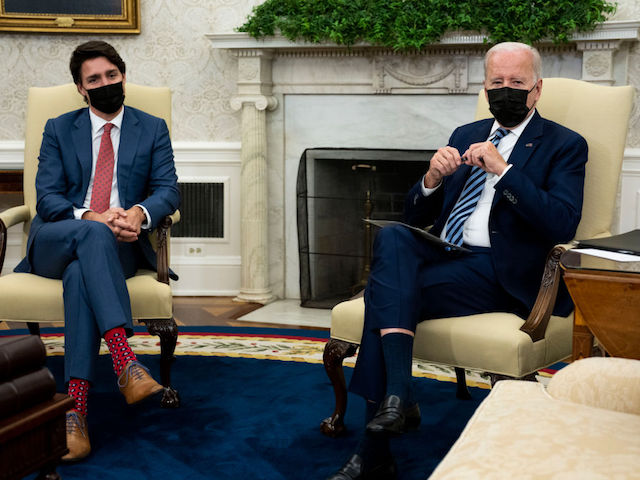
President Joe Biden and Prime Minister of Canada Justin Trudeau during a meeting in the Oval Office, Thursday, Nov. 18, 2021. (POOL Photo by Doug Mills/The New York Times)
Superficially, it would appear difficult for Biden to find a way to cause strife with Canadian Prime Minister Justin Trudeau, a far-left socialist and the leader of one of America’s closest allies. Yet, somehow, a Biden obsession that once led Brazilian President Jair Bolsonaro to threaten to declare war on the United States also ostracized Trudeau: Biden’s “green” agenda.
Towards the end of the year, Biden announced he would support a plan to offer tax subsidies to Americans for purchasing an electric vehicle – a move that would be devastating to both Canada and Mexico, which manufactures a significant percentage of real cars for Americans. Both Trudeau and Mexican President Andrés Manuel López Obrador came to Washington in November to complain.
“We underlined to what point this would be a big problem for auto production in Canada,” Trudeau said after the three met, referring to the proposed tax break. “We very clearly underlined our position.”
South Africa
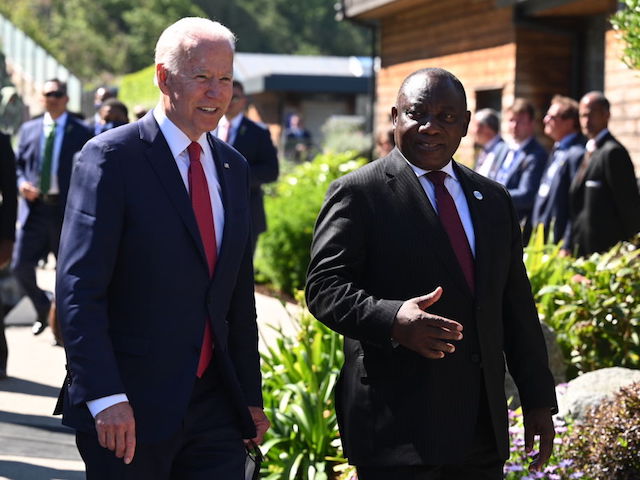
US President Joe Biden talks with South Africa’s President Cyril Ramaphosa at the G7 summit in Carbis Bay on June 12, 2021 in Carbis Bay, Cornwall. (Leon Neal/Getty Images)
In late November, Biden instituted a travel ban keeping citizens of South Africa, as well as several other southern African countries, out of America in response to the discovery of the omicron variant of Chinese coronavirus. South African scientists first discovered omicron and reported its existence to the World Health Organization (W.H.O.), but European countries later reported finding proof that it was on that continent before it reached Africa. Biden did not implement travel bans on Europeans.
The president of South Africa, Cyril Ramaphosa, responded to the African ban with an impassioned, nationally televised speech condemning them as unscientific and bigoted.
“These restrictions are unjustified and unfairly discriminate against our country and our Southern African sister countries,” Ramaphosa asserted. “The prohibition of travel is not informed by science, nor will it be effective in preventing the spread of this variant.”
Ramaphosa then engaged on a multi-country tour of Africa, where several other presidents issued statements condemning the Biden Africa travel ban. Other leaders affected referred to the move as “Afrophobic.”
In a move particularly embarrassing to the Biden administration, Ramaphosa boycotted Biden’s “Summit on Democracy,” a virtual summit meant to unite allied countries to discuss how to bolster democracy and confront threats to freedom around the world.
Taiwan
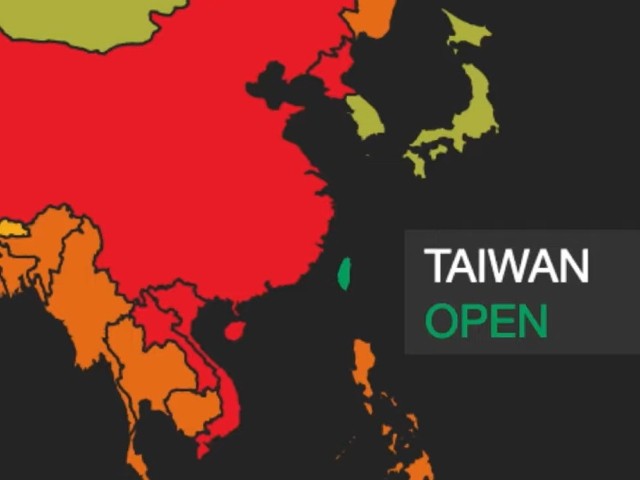
The abrupt disappearance of a live feed showing Taiwan’s digital minister occurred because the White House panicked over a map showing Taiwan in a different color than China, Reuters claimed on Monday.
The Biden administration found a way to anger allies who attended the “Summit on Democracy,” in addition to angering South Africa out of participating. During a presentation by senior Taiwanese minister Audrey Tang, the State Department abruptly cut the video feed from Taipei just as a map appeared on the screen showing freedom ratings in Asia. Taiwan appeared in green, meaning “most free,” while China appeared in red, meaning “least free.”
Taiwan, an ideological and political ally to the United States, was invited to the event despite Washington not officially recognizing it as a country. Taiwan is home to a sovereign, independent political apparatus, but China insists it is a province of the communist regime, a claim disconnected from reality. Anonymous Biden administration officials told Reuters the U.S. government cut Tang’s feed because the different colors implied Taiwan and China were separate countries and officials panicked that the visual would outrage China.
The Taiwanese government largely attempted to avoid commenting on the scandal, instead quietly thanking the Biden administration for any invite at all. Beijing, however, gloated, using its state media arms to openly laugh at both the Biden administration’s fear of China and the clumsy way it manifested.
Ukraine
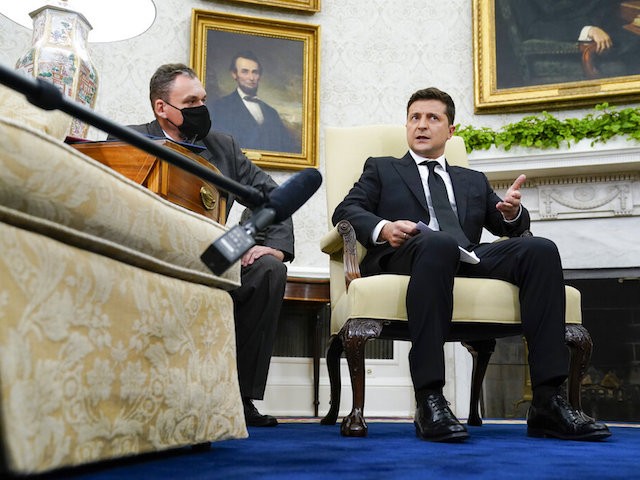
Ukrainian President Volodymyr Zelenskyy speaks as he meets with President Joe Biden in the Oval Office of the White House, Wednesday, Sept. 1, 2021, in Washington. (AP Photo/Evan Vucci)
In June, President Joe Biden decided to rescind sanctions on the Nord Stream 2 pipeline, a gas project linking Russia to Germany, and thus western Europe, that would severely hurt the Ukrainian economy and greatly increase Vladimir Putin’s leverage on the continent. Biden did not tell the Ukrainian government he would do this. The Russian government followed up the sanctions relief by flooding its border with Ukraine with tens of thousands of soldiers, prompting fears of another colonization move like Putin’s annexation of Crimea in 2014.
Ukrainian President Volodymyr Zelensky responded to Biden lending Putin a hand with an impassioned rant to the Washington, DC, outlet Axios in which he confirmed that he found out about the sanctions relief from the news shortly before Biden indicated to Zelensky he would tighten sanctions, not loosen them.
“You know, we had this first conversation with President Biden, it was a phone conversation, and I received all the signals. They were direct signals, and I was very happy about it,” Zelensky explained. “We were very unpleasantly surprised.”
Zelensky called the pipeline project a “weapon in the hands of the Russian Federation, and it is not very understandable, I feel, and definitely not expected, that the bullets to this weapon can possibly be provided by such a great country as the United States.”
Elsewhere in his remarks, Zelensky accused Biden of putting the bilateral relationship with Germany above “Ukrainian lives” and lamented he no longer felt “anger,” only “disappointment.”
Zelensky also requested that Biden meet with him prior to a scheduled meeting this summer with Putin to discuss the details of the ongoing Russian war in Donbas, eastern Ukraine. Biden snubbed Zelensky on multiple occasions and the two held a tepid White House meeting in September.
The meeting appeared to resolve nothing, because an angry Zelensky was again lamenting to reporters this month that Biden’s policies, and Europe’s, against Russia were too weak. The Biden administration had since promised to restore sanctions on the Nord Stream 2 pipeline, but only if Russia invades Ukraine.
“Our state is interested in a strong sanctions policy that would precede a possible escalation, and then, I suggest, this escalation might not even occur,” Zelensky explained, arguing that sanctions after the fact “won’t matter to anyone.”
Colombia
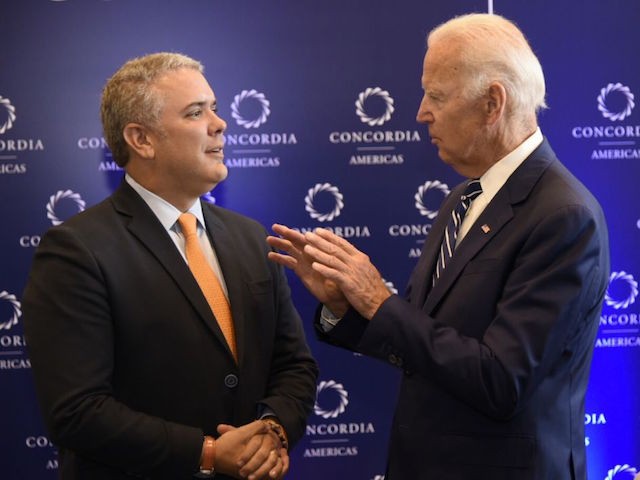
Ivan Duque Marquez, president of Colombia speaks with Joe Biden, Former Vice President of the United States, during the 2018 Concordia Americas Summit day 2 at Agora Bogota Convention Center on July 17, 2018 in Bogota, Colombia. (Photo by Getty Images for Concordia Americas Summit)
In what terrorism experts dubbed a baffling move, Biden removed the Revolutionary Armed Forces of Colombia (FARC), a half-century-old Marxist terrorist guerrilla, from America’s list of Foreign Terrorist Organizations in November. The State Department offered convoluted logic arguing that, because some FARC terrorists had allegedly laid down their arms as part of a failed peace deal passed in 2016, the group ceased to exist as it had traditionally. The State Department replaced the FARC on the list with “Second Marquetalía,” which it claimed was a core group of FARC leaders continuing to engage in terrorism. In reality, “Second Marquetalía” is the name that the FARC terrorists gave to their current war on the Colombian government, but they remain leaders in the FARC.
Colombian President Iván Duque, one of America’s most reliable allies, expressed dismay about the move.
“We would have preferred another decision,” Duque said after the State Department confirmed the delisting. “But knowing this, today we are concentrated on confronting the dissidents, confronting those groups and, as the United States said, those who have charges against them in their courts, the processes continue.”
Notably, socialist former guerrilla member Gustavo Petro, who lost to Duque in the 2018 presidential election, endorsed Biden “without the least bit of doubt” in the 2020 American presidential race.
Israel
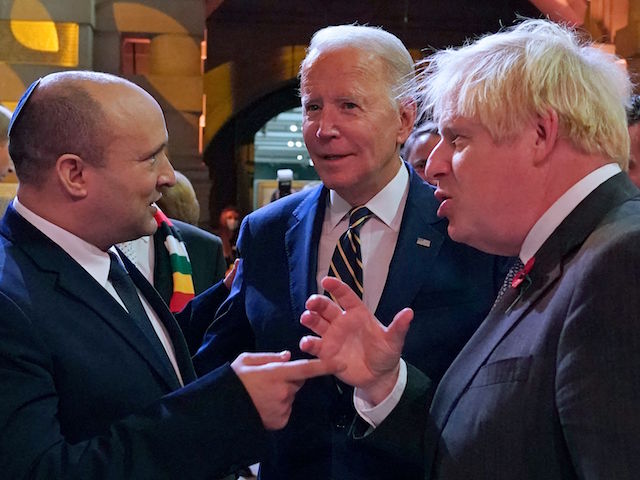
Israel’s Prime Minister Naftali Bennett (L), U.S. President Joe Biden (C) and British Prime Minister Boris Johnson (R) chat at a reception to mark the opening day of COP26 on the sidelines of the COP26 UN Climate Change Conference in Glasgow, Scotland, on November 1, 2021. (ALBERTO PEZZALI/POOL/AFP via Getty Images)
Biden has outraged the Israeli government on multiple occasions since taking office, from claiming he would build a consulate in Jerusalem to maintain ties with the Palestinian leadership – a violation of the Vienna convention – to repeatedly condemning Israeli settlements. The Israeli government has insisted that Jerusalem is the capital of Israel and any such consulate would have to operate out of Ramallah.
“The Americans bring up ‘settler violence’ all the time, obsessively,” a senior Israeli diplomat sighed to the Jerusalem Post this month. Another anonymous diplomat described Biden administration policies on the apartments as “baffling.”
While consistently condemning housing for Israelis, the Biden administration restored funding to Palestinian Authority projects cut during the Trump era because of the group’s continued financial assistance to terrorists.





Comments are closed.